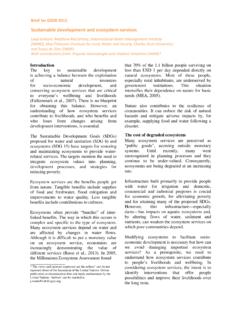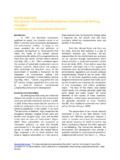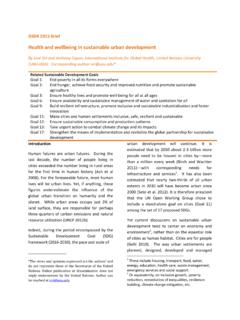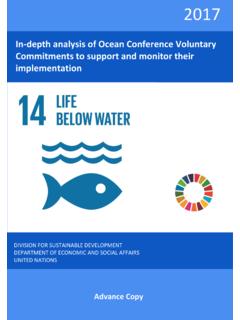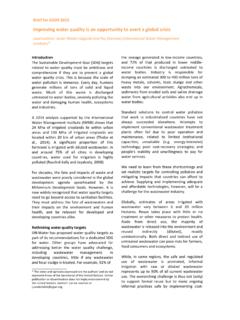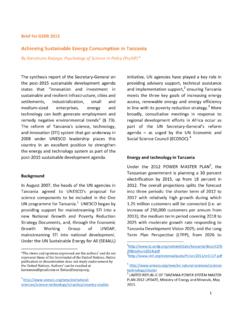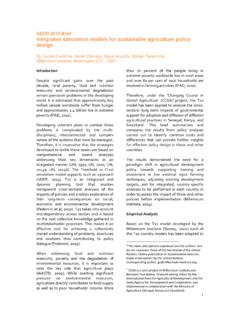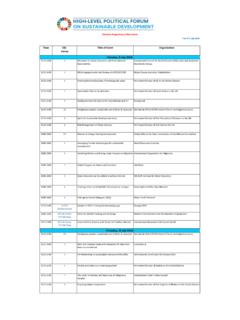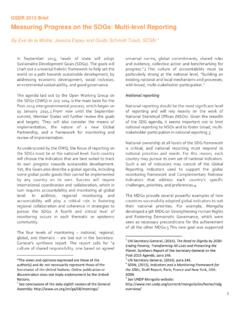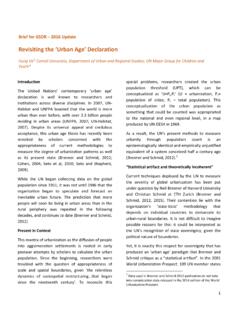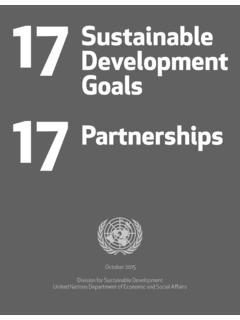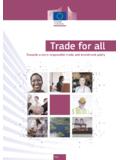Transcription of MOBILIZING for DEVELOPMENT
1 MOBILIZING . for DEVELOPMENT . Analysis and Policy Recommendations from the United Nations Secretary-General's High-Level Advisory Group on Sustainable Transport TABLE OF CONTENTS. Foreword by the Secretary-General 3. High-Level Advisory Group Call to Action 6. Executive Summary 7. Introduction 9. 1 Sustainable Transport - What It Delivers 10. Access at the Heart of Sustainable Transport 12. Global Trends and Challenges 13. Urbanization and urban-rural integration 13. Demographic changes 14. Global supply chains and trade routes 14. Digital connectivity 15. DEVELOPMENT of greener, more efficient propulsion technology 16. The Avoid-Shift-Improve' Approach 16. The climate change imperative 17. Making the economic case for sustainable transport 18. 2 How to Make Transport Sustainable 20. Policy DEVELOPMENT and Implementation 20.
2 An integrated approach to transport policy 20. Building capacity, especially in developing countries, to enhance safety and access 24. Stakeholder engagement and public awareness 27. Monitoring & Evaluation 28. Financing 29. Government funding 29. Engagement with the private sector 30. Fiscal- and market-based measures 30. Finance from international financial institutions 32. Climate funds 32. Technological Innovation 33. Enabling transformative technology 33. Power 34. Vehicles 34. Systems 35. 3 Conclusions 39. 4 Recommendations 40. The Secretary-General's High-level Advisory Group on Sustainable Transport 44. ACKNOWLEDGEMENTS 62. ENDNOTES 63. CASE STUDY REFERENCES 66. PHOTO CREDITS 67. FOREWORD BY THE SECRETARY-GENERAL. Sustainable transport is fundamental to progress in realizing the promise of the 2030 Agenda for Sustainable DEVELOPMENT and in achieving the 17 Sustainable DEVELOPMENT Goals.
3 Sustainable transport supports inclusive growth, job creation, poverty reduction, access to markets, the empowerment of women, and the well-being of persons with disabilities and other vulnerable groups. It is also essential to our efforts to fight climate change, reduce air pollution and improve road safety. Yet despite this critical role, sustainable transport has not been given adequate recognition. It was in this context that I formed the High-Level Advisory Group on Sustainable Transport to develop recommendations to help the world address rising congestion and pollution, particularly in urban areas, and to better tap into the tremendous opportunities that sustainable transport can make possible. This report sets out forward-looking recommendations. It is also meant to serve as a contribution to the first-ever Global Sustainable Transport Conference, which I will convene in Ashgabat, Turkmenistan, on 26-27 November 2016.
4 I thank the Members of the High-Level Advisory Group for their efforts and dedication, and encourage all partners to work together for progress on this key global endeavour. New York City, October 2016. United Nations Secretary-General Ban Ki-moon clean Technology advancing fuels and clean energy is a high priority, and when considering the scale of the health and climate challenges, . it is an imperative. 5 MOBILIZING Sustainable Transport for DEVELOPMENT combines Effective transport planning the need for short-term deliverables with a long-term view.. HIGH-LEVEL ADVISORY GROUP CALL TO ACTION. In 2015, the world's community came together to determine what kind of future we would leave to the next generation. The world set bold, transformative goals in sustainable DEVELOPMENT , financing for DEVELOPMENT and climate change, proclaiming in all of these contexts that business as usual' is no longer a viable option.
5 As members of the High-Level Advisory Group on Sustainable Transport, we represent developed and developing countries and a wide range of modes and sectors, including the public sector, non-state actors and private companies. We see a strong economic case for sustainable transport complemented by a compelling human argument. Every member of the Advisory Group, in spite of our disparate perspectives and backgrounds, agrees that all decisions made on transport must have people and their quality of life at the centre. We submit that the achievement of the Sustainable DEVELOPMENT Goals depends on the determined and innovative pursuit of sustainable transport, with ambitious action by governments and businesses alike. The transport sector is large, diverse and complex, and infrastructure decisions and investments have an especially long lifespan.
6 This makes our choices today critically important for tomorrow. We are resolved to advocate for bold choices, seizing this moment in time, engaging the public and private sectors and all relevant stakeholders, and taking advantage of new approaches in transport planning and policy DEVELOPMENT , new technology, and the global resolve toward achieving the 2030 Agenda for Sustainable DEVELOPMENT and the Paris Climate Agreement. 7 MOBILIZING Sustainable Transport for DEVELOPMENT EXECUTIVE SUMMARY. In 2014, United Nations Secretary-General Ban Ki- of energy-related greenhouse gas emissions come moon appointed an independent High-Level Advisory from transport; and road congestion is a tremendous Group on Sustainable Transport to provide a focused burden on the economy, currently accounting for set of recommendations on how the transport sector of the GDP in the United States, 2% of GDP in Europe, can advance sustainable DEVELOPMENT with poverty 2 5% of GDP in Asia, and as high as 10% of GDP in eradication at its core, promote economic growth, and some cities of emerging economies, including Beijing, bolster the fight against climate change.
7 The outcome S o Paulo and , 2. of this effort is MOBILIZING Sustainable Transport for DEVELOPMENT , the first ever Global Sustainable Transport There are also enormous opportunities presented by Outlook Report, addressing all modes of transport, in sustainable transport: saving hundreds of thousands developing and developed countries. of lives every year through improved road safety and reduced air pollution, and reducing carbon emissions Transport drives DEVELOPMENT , links people, connects local by 7 The transformation to sustainable communities to the world, builds markets and facilitates transport requires a redirection, rather than any trade. In turn, sustainable transport drives sustainable substantial increase, in infrastructure expenditure and DEVELOPMENT , fundamental to meeting the needs of people can be realised through an annual investment of around in their personal and economic lives, while respecting the US$2 trillion, similar to the current business as usual'.
8 Ability of future generations to meet their needs. spending of US$ to US$ When considering full transport costs, including fuel, operational expenses, The High-Level Advisory Group defines sustainable losses due to congestion, and vehicles, sustainable transport as the provision of services and transport can deliver savings of US$70 trillion by infrastructure for the mobility of people and goods In addition, improvements in border administration, advancing economic and social DEVELOPMENT to transport and communication infrastructure could benefit today's and future generations in a manner increase global GDP by US$ trillion, or that is safe, affordable, accessible, efficient, and resilient, while minimizing carbon and other emissions The High-Level Advisory Group promotes a tailored and environmental impacts.
9 Avoid-Shift-Improve' approach as a useful framework for assessing transport measures and for taking action Transport is not an end in itself, but rather a means in support of sustainable passenger and freight allowing people to access what they need: jobs, markets, transport. Applying these principles will promote social interaction, education, and a full range of other a combination of multimodal, collective-shared services and amenities contributing to healthy and fulfilled mobility solutions and sustainable transport systems. lives. The report moves away from a focus on providing The concept of enabling is a critical addition to the mobility based on individual motorized transport and framework, and it is in the realm of enabling that many improved traffic speed, to the idea of access through of this report's recommendations have been developed.
10 Transport, prioritizing people and their quality of life, Throughout the Advisory Group's analysis, certain with strong attention to safety and social equity. The 2030 themes recur, including the paramount importance of Agenda for Sustainable DEVELOPMENT charts this kind taking an integrated, holistic approach to policy and of course. Through sustainable transport, we can make investment decisions and the benefits of engaging with significant progress on the Sustainable DEVELOPMENT a wide range of stakeholders and funding sources. The Goals and the Paris Climate Agreement, improving the Advisory Group recognizes that technology promoting lives of billions of people around the world. clean fuels and clean energy are of high priority, and the Group gives the needs, challenges and opportunities in The report addresses global trends, including developing countries particular weight.
